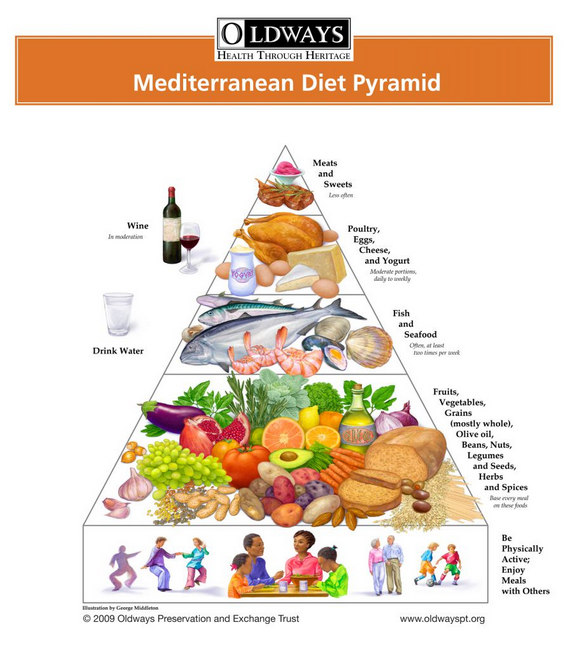International Mediterranean Diet Month 2015: Everything You Need To Know About This Sea Of Flavor, Health

By now many of us are familiar with the Mediterranean Diet. But during the month of May, the Oldways’ Mediterranean Foods Alliance likes to “shine an extra special light” on all the diet has to offer.
According to their website, Oldways — a food think tank based in Boston — launched the alliance as a way to help people discover Mediterranean foods, flavors, as well as help food companies build their brands around the diet. While the diet is inspired by the traditional food and drink of countries surrounding the Mediterranean Sea, such as Spain, Italy, and Greece, Oldways, the Harvard School of Public Health (HSPH), and the European Office of the World Health Organization reportedly introduced the “classic Mediterranean Diet” in 1993 at a conference in Cambridge, MA. The Mediterranean Diet Pyramid was also introduced as a way to make complying with the diet easier.

Lifehacker reported “food pyramids break up macronutrients into more specific categories;” the ones at the top of the pyramid should be avoided or eaten sparingly compared to what’s towards the middle and bottom. In the case of the Mediterranean diet, that would be fewer meat and sweets, a moderate amount of poultry and dairy, and a whole lot of fish, fresh fruit and vegetables, whole grains, oil, legumes, and physical activity.
Sea of Health Benefits
US News & World Report ranked the Mediterranean Diet the number one plant-based diet, as well as the third best diet overall. It’s also the third best diet for healthy eating and the third easiest diet to follow, as well as the fourth best diet for heart-health. And there’s no short supply of research to support these rankings.
Research presented during this year’s American College of Cardiology’s 64th Annual Scientific Session found the Mediterranean diet helps cut risk for heart disease in half. The more Mediterranean options study participants ate — at least 11 of the 55 available — the less likely they were to develop disease. What’s more is a 2014 study published in the journal Stroke found this particular diet controls blood pressure, thus lowers risk of first-time stroke, while additional research shows sourcing more of the Mediterranean’s extra-virgin olive oil and nuts lowers risk of developing peripheral artery disease.
That heart disease causes 80 percent of erectile dysfunction cases is why many men are referred to the diet. Though the heart (and sometimes impotence) isn’t all that stands to improve when eating like an Italian, or Spaniard, or Greek.
Studies show following a Mediterranean diet can improve cognition and memory, as well as lessen risk for kidney disease; diabetes; and dementia. If that weren’t enough, two different studies have linked the Mediterranean diet to longevity; women especially are 40 percent more likely to live past the age of 70.
“The evidence base for the Mediterranean diet in preventing all of the chronic diseases plaguing the western world is overwhelming,” Aseem Malhotra, an interventional cardiology specialist, said in a previous statement. “Policymakers and the public need to know that such a diet is far more potent than the often dubious benefit of many medications and without side-effects.”
Sum of Its Parts
The individual foods recommended under the Mediterranean diet are healthy in their own right. Eating more fruits and vegetables (full of antioxidants), for example, reduces risk for mortality — and fruits and vegetables are among the core group of foods each Mediterranean meal should be based off. If not fruits and vegetables, than it’s a choice between whole grains, olive oil, beans, nuts, legumes and seeds, and/or herbs and spices.
There’s also something to be said for the amount of fish Mediterranean diets consume, at least two servings each week. Oily fish, like salmon and mackerel, are rich in omega-3 fatty acids (as are some vegetable oils, green vegetables, and walnuts). The HSPH reported, “we need omega-3 fatty acids for numerous normal body functions, such as controlling blood clotting and building cell membranes in the brain.” HSPH added omega-3s might protect against heart disease and stroke, as well as cancer, inflammatory bowel disease, and other autoimmune diseases, like lupus and rheumatoid arthritis, too.
The body can’t make omega-3s on its own, adding further value to these nutrient-rich foods.
"Omega-3 fatty acids are really important to human health, whether you're talking about CVD, brain or immune health,” Philip Calder, a metabolic biochemist and nutritionist from the University of Southampton, said in a press release. “Heath professionals have a key role to play in educating the public about the beneficial effects of including fish in their diets.”
Olive oil and nuts tend to be the staple Mediterranean foods placed under scrutiny; these are, after all, high in fat. The thing is, they’re high in healthy fat. Monounsaturated fats are fat molecules that have one unsaturated carbon bond, or a double bond, and they can help reduce bad cholesterol levels, the American Heart Association reported.
Better Together
The Mediterranean diet essentially combines foods individually high in antioxidants, omega-3 fatty acids, and good-for-you fat for an even healthier eating experience; it doesn't ban entire food groups, making it easier for dieters comply long-term. Depending on the meals dieters enjoy, foods can also be high in healthy nutrients and vitamins, like fiber, potassium, calcium, and vitamin D.
Perhaps more healthy than the Mediterranean's traditional menu is their tradition, even ritual, to sit down and eat with each other. Communal eating occurs less in today's society, but taking the time to eat and drink in someone else's company can boost social connection, happiness, and individual sense of belonging. Bonus: a 2010 study published in the Journal of Nutrition Education and Behavior found children of families who ate together also made healthier choices throughout the week.
"Food and drink are the lifeblood of social cohesion, integration and differentiation, and are active ingredients in humans' perceived ties to the sacred and the supernatural," Dr. Thomas M. Wilson, a professor of anthropology at Binghamton University, said. "Both food and alcohol build and enhance peoples' senses of belonging and becoming, the twin bases to social identity."
Don't worry; the Mediterranean diet doesn't skimp on alcohol. Wine is actually listed on Oldways' pyramid, an alcoholic beverage with its own set of health benefits. That said, there are some caveats. For one, the diet isn't necessarily conducive to weight loss, or at least science has yet to find a strong enough relationship. And two, some of the diet's staple foods may cost you more than usual at the grocery store.
“[The Mediterranean Diet is] moderately pricey,” US News reported. “While some ingredients (olive oil, nuts, fish and fresh produce in particular) can be expensive, you can find ways to keep the tab reasonable. Can’t spring for the $50 bottle of wine? Grab one for $15 instead. And snag whatever veggies are on sale that day, rather than the $3-a-piece artichokes.”



























